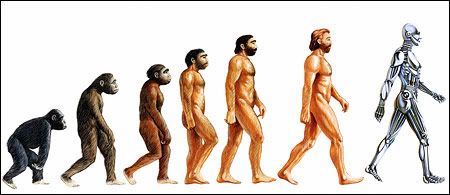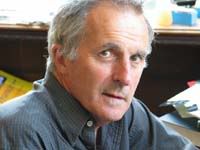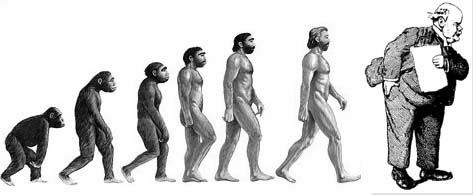
The Language of the Genes
Steve Jones
Flamingo 1994
pp 347
I was tucking into my curried tatties - Maxima is half-Irish and can do anything with the d
 amn things - minding my own business this evening, when the author of a book I'm reading came on Chris Evans' Radio 2 show.
amn things - minding my own business this evening, when the author of a book I'm reading came on Chris Evans' Radio 2 show.Steve Jones is an evolutionary biologist who started his career as a malacologist (snail-ologist), and I was given his book, The Language of the Genes, by a friend who expected to enjoy watching me explode in righteous inarticulacy. Instead, I was riveted.
 Most geneticists have to deal with the fact that their science had inauspicious origins, and Jones deals with this frankly in the introduction. Social Darwinism was founded largely by liberal Victorian thinker Herbert Spencer and Francis Galton, Charles Darwin's half-cousin. Through Galton's influence, the movement - which mortified Darwin - morphed from letting evolution carry on without interferences such as healthcare and philanthropy into eugenics, which was very much involved with interfering with evolution. The pseudo-science served as a cover for figures from all parts of the political spectrum who were concerned for the future of the white race - whatever race is apart from societally-determined constructs based on arbitrary classification of features, mainly (but not exclusively) skin colour. Jones relates an anecdote towards the end of the book:
Most geneticists have to deal with the fact that their science had inauspicious origins, and Jones deals with this frankly in the introduction. Social Darwinism was founded largely by liberal Victorian thinker Herbert Spencer and Francis Galton, Charles Darwin's half-cousin. Through Galton's influence, the movement - which mortified Darwin - morphed from letting evolution carry on without interferences such as healthcare and philanthropy into eugenics, which was very much involved with interfering with evolution. The pseudo-science served as a cover for figures from all parts of the political spectrum who were concerned for the future of the white race - whatever race is apart from societally-determined constructs based on arbitrary classification of features, mainly (but not exclusively) skin colour. Jones relates an anecdote towards the end of the book:In 1987, a secretary from Virginia sued her employer for discriminating against her because she was black. She lost the case on the grounds that, as she had red hair, she must be white. She then worked for a black employer and, undaunted by her earlier experience, sued her for discriminating against her as she was white. She lost again: the court found that she could not be white as she went to a black school.That all this was not consumed in the obscene flames of the Holocaust is borne out by both last century's history and recent events.
In Fatal Misconception: the Struggle to control World Population, Matthew Connelly relates how de Gaulle thought that post-war France had become too "Latinized", and approved a scheme for "an infusion of Nordic blood" which included persuading German prisoners of war to marry French women.
A row has recently erupted about a pioneer of eugenics being featured on stamps. As the Dail
 y Telegraph's Gerald Warner points out, Marie Stopes was an ardent admirer of Hitler, supported compulsory sterilisation of the "diseased", and formulated the slogan "Joyful and Deliberate Motherhood, A Safe Light in our Racial Darkness". (Her organisation was called the Society for Constructive Birth Control and Racial Progress; it bears no links to Marie Stopes International - this was born when the Population Services Family Planning Programme bought the rights to her name from the British Eugenics Society post-WWII.)
y Telegraph's Gerald Warner points out, Marie Stopes was an ardent admirer of Hitler, supported compulsory sterilisation of the "diseased", and formulated the slogan "Joyful and Deliberate Motherhood, A Safe Light in our Racial Darkness". (Her organisation was called the Society for Constructive Birth Control and Racial Progress; it bears no links to Marie Stopes International - this was born when the Population Services Family Planning Programme bought the rights to her name from the British Eugenics Society post-WWII.)Combining a lightness of touch with the depth of his knowledge of his subject, Jones then proceeds to take us on a journey of discovery that passes through biochemistry, virology, palaeopathology, discrimination, the evolution of evolutionary science and gender politics. Indeed, three-quarters of my family would be pleased to read in the chapter on The Battle of the Sexes that "We are still not certain why males exist; and why, if we must have them at all, nature needs so many...the frank answer is that...although the reason for the existence of women is obvious enough, nobody has any real idea what point there is in being a man."
I would answer that one in the words of Genesis 1:27: "So God created man in his own image...male and female he created them". And for good reason: as Jones points out, the product of sexual reproduction is a genetically unique individual every time, whereas in asexual reproduction, an unfavourable mutation is there to stay. Jones, however is not a man of faith; but, while he holds some strong views on creationism, he is not an ideologue like, say, Richard Dawkins - he refers to Biblical quotes several times in his arguments; although he might not believe in the historical books, he unashamedly points to their feasibility.
Another point at which he diverges from Dawkins is in his refusal to reduce human beings to disposable vehicles for genetic material; he states: "To make too much of the shared DNA of chimps and humans is to be in danger of falling into...foolishness. Humans, uniquely, are what they think." Later, in case the point hasn't got through, he refers to Dawkins' book The Blind Watchmaker (which is a parody of William Paley's parable of finding a watch in a field and realising that it must have been, as we might say, "intelligently designed"):
There is a danger of seeing the whole of biology as evidence of natural selection. Just as Paley saw the complexity of life as an argument for God, there is a neo-Paleyism which plagues evolutionary theory. It argues that all animal structure is well adapted so that it must always reflect the action of selection...Some feel that the Darwinian theory drives the whole of evolution from the order of the bases in DNA to the shape of the nose...Another beauty - and an important weakness - of the theory of evolution by natural selection is that with a little imagination it is possible to come up with an explanation of anything...Many are fantasy, but because they invoke events which took place in the distant past they are almost impossible to refute.The Language of the Genes concludes with a reflection on the dangers of making too much of the genome, in which he refers (in 1994) to a movement "to add to the Universal Declaration of Human Rights a statement that everyone has the right to a genetic constitution which has not been changed without their consent". In 2004, the Vatican's International Theological Commission released Communion and Stewardship: Human Persons Created in the Image of God, which was published under the auspices of Cardinal Josef Ratzinger, now Pope Benedict XVI. Paragraph 91 states:
"The uniqueness of each human person, in part constituted by his biogenetic characteristics and developed through nurture and growth, belongs intrinsically to him [sic] and cannot be instrumentalized in order to improve some of these characteristics...Such modifications would in any case violate the freedom of future persons who had no part in decisions that determine his bodily structure and characteristics in a significant and possibly irreversible way [but] gene therapy...would help the individual to give full expression to his real identity which is blocked by a defective gene.By 2006, the best that UNESCO's Universal Declaration on Bioethics and Human Rights had come up with was that "The impact of life sciences on future generations, including on their genetic constitution, should be given due regard".
Much of this section might have been written last week, instead of over a decade ago. Jones tells us of an insurance company that offered to test a couple's unborn child for the gene for cystic fibrosis "only if the parents agreed to have an abortion if the test was positive". Mass testing might (then) cost £50,000 per person for every case of cystic fibrosis "prevented" - "much less than the cost of lifelong treatment" (although he notes that a hundred times more people may carry the gene than have the disease). This is the logic, I think, that will increasingly inform the policy-making of government, health and insurance agencies should the present financial crisis turn out to be a long-term phenomenon. Which poses the question: are people with disabilities, health-needs or a probability of developing these in the light of their genome seen to have any intrinsic value? (Jones: "Is a damaged gene a pre-existing condition?")
The reason that Jones was appearing on Evans' show was down to his statement - fleshed out in an article he has written for the Telegraph - amplifying TLG's conclusion that "it looks as if the human mutation rate is on its way down...we are almost at the end of [our] evolutionary road". So the eugenicists have failed in their bids to control human evolution - but the ethical dilemmas we inherited from them have not left us, they have merely mutated from the racial sphere to the financial.












"as Jones points out, the product of sexual reproduction is a genetically unique individual every time, whereas in asexual reproduction, an unfavourable mutation is there to stay."
ReplyDeleteNot quite...
Any mutation can change again, especially as there seems to be some evidence that some parts of our genes are more prone to mutation than other parts.
But the question is not really "why are there any males?" but rather "why are there as many males as females?" After all, one male can fertilise several hundred females without much difficulty. From a biological point of view, 99 males out of 100 are a complete waste of resources.
Thanks for your comment, Paul - fair point! I think the answer to that one's in the Bible...
ReplyDelete